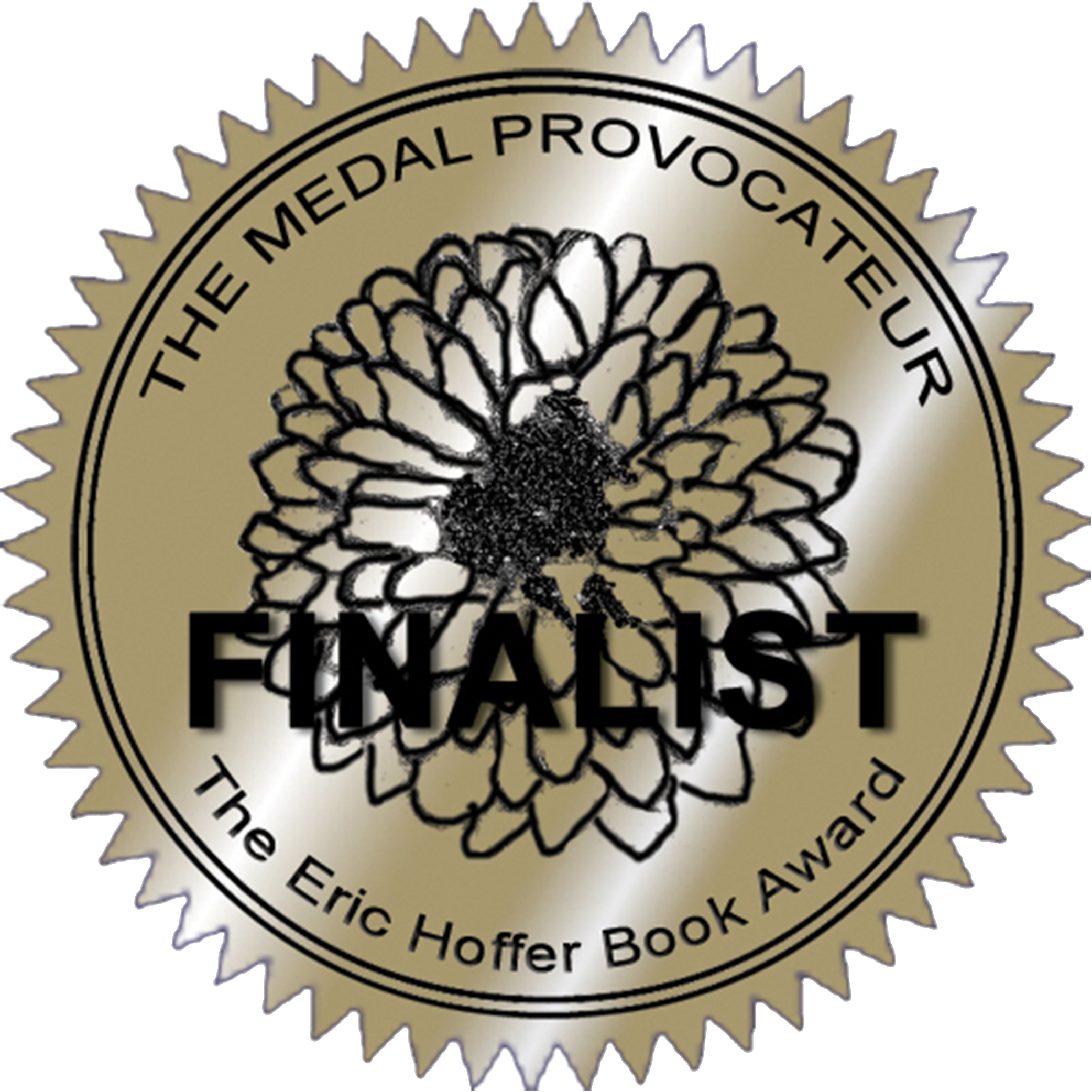Awards & Recognition
Laertes received the Eric Hoffer Book Award for Best Micro Press of 2025 for No One is on the Line.
No One is on the Line was also placed on the Grand Prize Short List for 2025 by the Eric Hoffer Awards.
Wrongland was a 2025 finalist for the Eric Hoffer Montaigne Medal which recognizes books that illuminate, progress, or redirect thought.
No One is on the Line was a 2025 finalist for the Eric Hoffer Medal Provocateur Award which is given to collections on frontier of poetry—the experimental, the innovative, the daring and stunning, the impromptu in technique and voice.
A 2025 IPPY award was presented to Laertes for New Moon: Day One, for cover design.
A 2024 IPPY award was presented to Laertes for A Dictionary of Emotions in a Time of War: 20 Short Works by Ukrainian Playwrights in the category of Current Events: Social Issues, Humanitarian.
Laertes was the recipient of a 2022 IPPY award: a bronze medal for website design for the work of Ryan Dann.
A bronze medal for book design was presented by PubWest in 2021 for Giovanni Pascoli: O Little One and Selected Poems.
Laertes was the recipient of an IPPY award for Clearing the Ground: the silver medal for cover design for fiction, 2016.
A PubWest gold medal for book design was presented to Laertes in 2016 for Clearing the Ground.
Praise for A Dictionary of Emotions in a Time of War: 20 Short Works by Ukrainian Playwrights
Of the 50 best books of 2023, ranked by The Telegraph, A Dictionary of Emotions in a Time of War: 20 Short Works by Ukrainian Playwrights was deemed to be #21.
A visceral, fearless, and often heated collection of poetry, diary entries, short stories, dramatic monologues and dialogues, scripts, and social media exchanges. It is not always clear if these pieces are fiction or memoir, but either way, the personal tragedy is apparent in every single one . . . The combined talents of playwright and translator have created something quite extraordinary, free from cliché and the tired metaphors of war . . . The contributors to A Dictionary of Emotions in a Time of War prove not only that art is possible after a crime against humanity but also that it is possible during one. A Dictionary of Emotions in a Time of War will surely become one of the defining pieces of art from this horrific era of history. — Ada Wordsworth, Los Angeles Review of Books
These twenty short works . . . function as documentary sources of sorts, recording visceral responses to Russia’s full-blown invasion of Ukraine. They are honest, though not journalistic. They do not attempt to evince neutral facts and objectivity. They each testify, through form as much as content, to the turbulence and trauma of the Ukrainian experience. A veneer of fictionalization transforms them into works of intimacy on a universal scale . . . These complex sequences are stories with new names. To read them, to hear them aloud, to speak them in your own voice and language, is to scratch a star into the global constellation of collective action sustaining the new meanings of Ukraine. —Michelle Chan Schmidt, Asymptote
Each work speaks to the others while remaining inherently its own. A collection of immediate and visceral responses that explore and explode the range of theater and performance. — Bryan Brown, New Theatre Quarterly
These plays reflect the shock of a peaceful people who were invaded and relentlessly attacked, destroying all the cornerstones of daily life they had known. We read these plays as sympathetic bystanders; they open our eyes to pain, suffering, injustice, war, tragedy where all of humanity is the loser, and ethical foul play. But also let us read these plays as kindly-meant warnings. One year ago, a vortex of irrationality overwhelmed a sovereign people who were nearly as confident of their peacetime security as those of us living in western Europe, America, and the free world still are. —Dana Rufolo, Plays International & Europe
Praise for Thanassis Valtinos: Early Works
No one matches Thanassis Valtinos’s ability to capture Greece’s Twentieth-Century experience in all its complexity and breadth—and this collection brings together wonderful translations of some of his best works. —Stathis Kalyvas, Oxford University
Jane Assimakopoulos and Stavros Deligiorgis’s translations rise deftly to the many challenges presented by these four important works by Thanassis Valtinos, with their range of tones, registers, and narrative styles. The writing is, like Valtinos’s, spare and strong, with rare lyrical flashes, and a force and forward momentum that keep you turning the pages until the very end. —Karen Emmerich, Princeton University
Traces of the storyteller cling to the story the way the handprints of the potter cling to the clay vessel, Walter Benjamin once observed. In Valtinos’ stories, a master prose strategist manipulates form, texture, and momentum into a voice that bears witness to the deepest tracks of a turbulent Greek experience. Recognizing and confronting this image in the present is a heart-rending and urgent experience. —Vangelis Calotychos, Brown University
Thanassis Valtinos’s prose is distinguished by an ongoing dialogue with key periods of twentieth-century Greek history. It is driven by the desire to give voice to anonymity and therefore to that which history forgets, marginalizes, or leaves out. These long-awaited translations of his early works capture Valtinos’s unique story-telling style and effectively convey the orality of his heroes. —Anthony Dracopoulos, University of Sydney
Valtinos’s fiction questions the solidity of the past by bringing together documentation and self-doubt, an anxiety about history, and a preoccupation with language and form. This collection of his early works offers insights into the artistry of one of Greece’s most influential writers. —Dimitris Tziovas, University of Birmingham
Drawing on work from three decades of Thanassis Valtinos’s literary output, his translators have compiled a volume entitled Thanassis Valtinos: Early Works . . . making available to an international audience the works by this eminent post-war, post-Modernist Greek author that foreground his literary motifs and mark the beginnings of his definitive influence on Modern Greek fiction.The translators, well-practiced in Valtinos’s style of writing, render his Spartan language in correspondingly austere speech, preserving at the same time his intensely vivid but low-key lyricism. —Lamprini Koyzeli, Vima, Athens
Praise for Giovanni Pascoli: O Little One and Selected Poems
John Martone has managed to rediscover the poetry and prose poems of one of the great Italian poets of the late nineteenth and early twentieth centuries: Giovanni Pascoli. There’s such a deep plangency and nostalgia to be found here, resurrected for us in an American idiom which evokes, among others, William Carlos Williams and Robert Creeley, skillfully embedded in the haiku-reinforced forms that all four poets so quietly and yet brilliantly employ. And yet for me there’s something more in Pascoli, something of the luminousness of the little child within each of us: that sense of awe and wonder, which the winds and storms of time do what they can to erase, but which these poets, singing (and weeping) a century apart, return Odysseus-like to us in poem after poem. Oh, that still faint, necessary music! How beautiful it is! And how restorative. —Paul Mariani
John Martone offers anglophone readers an essential Pascoli. He renders Pascoli’s voice with an evocative sparseness that effectively captures the sense of sudden, precise sensory impressions against a nebulous, hazy horizon. These translations allow us to hear the echoes of Wordsworth while drawing out Pascoli’s modernity through renditions that resonate with imagism. “In the case of poetry, one has to draw close in order to hear it.” Martone brings Pascoli closer to us. —Maria Rosa Truglio
The poems in their simplicity and focus on the natural world sometimes remind me of Garcia Lorca or certain Chinese poets or even early poems of Robert Bly . . . There is much to delight here. —Lou Lipsitz
Giovanni Pascoli “addresses the deepest part of himself ” and in doing so addresses the nature of language. Here is a moral harmony; a manifesto for a poetry of common memory and dream. Pascoli, quite simply, names truth; while of the nineteenth century, he is utterly contemporary. There is much of timeless poetics here, something of Blake’s visionary innocence, something of Whitman’s self-contradictions, yet Pascoli has his own tragic sadness to reconcile: He is unique. In John Martone he has met his perfect translator. Martone matches Pascoli’s erudition and intelligent ordering. He brings us a clarity from the limpid and sometimes conflicting apparent simplicity of Pascoli’s work. O Little One is vital to everyone who loves poetry. —Gerry Loose
Martone’s translations convey with grace the simplistic beauty of Pascoli’s verse, in both prose and poetry, and allow English-speaking readers to enter into his world. Most anyone with an interest in poetry and world literature would enjoy Martone’s translations, but I particularly recommend them to Italian American readers as a means of opening a window onto their cultural heritage. Pascoli’s works were written during the same historical period in which the great wave of Italian emigration to America began, and they give voice to the anguish and tensions of the times. The theme of home and family as symbolic places of refuge, scenes from Italian country life and its natural surroundings, reflections on death and grief, an exploration of the relationship between language—in dialectic, standard or classical form—and transcendent understanding, and, at the heart of O Little One, the reliance on the spirit of one’s childish self for inspiration and succor in troubling times, imbue the works that Martone has translated, and by engaging with them we can gain greater insight into the cultural elements that continue to inform contemporary Italian American identity. —Carla Simonini
Praise for Clearing the Ground
I scanned Cavafy availed by 15 pundits of translation and criticism; only now I begin to discern this poet to be a man as I would be, a man whose diversified fulfillments and consummations were to be held within one apprehension, the which, I now discern, he had achieved. Thank you, Martin McKinsey. —Richard Howard
It strikes me as a must for anyone interested in modern poetry, queer studies, or (as I am most) how a poet discovers the courage and conviction to make a lasting mark in language. —Joshua Weiner
An important contribution to primary and secondary bibliographies of modern gay letters. —Josiah Blackmore
McKinsey’s technique of reporting the poet’s jottings and then placing a relevant poem in the midst of those jottings brings Cavafy (not to mention the poem in question) alive in a way that, at least for me, has never happened before. —Peter A. Bien
The notes put each poem in a new light. —Thomas W. Laqueur
No one interested in the hidden currents that electrify great literature can afford to miss Clearing the Ground. —Djelloul Marbrook
A pleasure to read . . . the fruit of a very long scholarly engagement with Cavafy and also the work of a skilled translator with acute critical sensibilities . . . An attractive, user-friendly, creative and informative volume, which will delight and enlighten many readers. —Sarah Ekdawi, Byzantine and Modern Greek Studies, Cambridge Core












